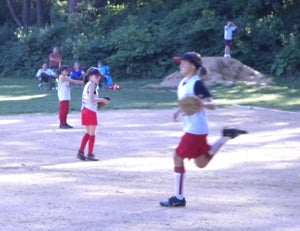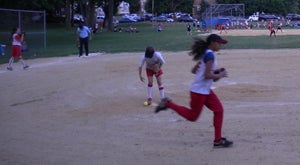Fox-Rok’s success measured in fun

In part one of a two-part series, NEast Philly examines what goes into making an athletic association successful, and what two neighborhoods are doing to keep kids active.
As youngsters, we rarely considered the time and effort that went into running the machine-pitch baseball teams we played for, much less the work it took getting us runts to play a remotely coherent seven innings. Looking at expansive youth athletics organizations like Fox-Rok Athletics Association, one wonders what has made this community staple tick for nearly 60 years.
Fox-Rok AA corresponding secretary Ken Warner said there is more to building a successful organization than might even come to mind for most.
“Without volunteers, we wouldn’t have an organization,” Warner admits. “You need to have community support.”
Warner remembers when he joined Fox-Rok’s board of directors as both the secretary and later webmaster. He reminds anyone new to the organization that everything they need is on the Fox-Rok website.
“They weren’t computer savvy and I happened to be at the time,” Warner recalled. “They had a lack of communication that maybe they didn’t realize. Written and oral communications is key today.”
Warner said there is even more at stake when getting a community athletics organization to operate effectively.
“You have to have a financial backing. It’s outrageous what this all costs us,” he said.
Warner says that Fox-Rok receives a good amount of its funding from local business sponsors. Some of which place their advertisements on team uniforms. While Fox-Rok girls softball coach Jon Doherty said agrees the financial aspect is important, he also thinks that there is even more that contributes to a successful community sports club.
“On a board or director level, every question boils down to what’s good for the kids,” Doherty said. “It doesn’t come down to money, egos or agendas from certain people. We just ask ourselves, ‘What’s good for the kids?’ That’s what always has driven the organization and we’ve done well with that.”
Doherty mentioned that Fox-Rok’s process of grooming and selecting coaches, board members and volunteers has contributed to much of the club’s longevity. Fox-Rok even hosts a program that trains driven players from as young as 13 years old to coach when they come of age, Warner said.
“We really take our time, and what I do in the years when they come through tee ball and coach pitch, I get to see just about every coach,” Doherty said. “We’re doing a filtering system for our coaching.”
Doherty said he believes that when the kids come first, everything else falls into place. It’s that philosophy that has driven Fox-Rok into being a club that draws in members from other neighborhoods, according to parent Greg Riley.
An Oxford Circle native, Riley’s community was no longer offering youth sports by the time his daughter wanted to play softball, which lead him elsewhere.
“Fox-Rok was recommended by a lot of different people that we know,” Riley said. “So, I made a few phone calls and even though we didn’t have much time to get in, they fit us in. We were last minute getting in here and everybody was accommodating and helpful.”
Riley said he feels the interest for parents to get involved in their kids’ lives isn’t there like it used to be in his neighborhood, and parent volunteers were hard to come by.
“We lost a couple of good coaches, we lost the gentleman that was organizing things down there and it just went down the tubes,” he said. “Once you lose those people that are putting these things together, you don’t have it anymore.”
Warner agreed with the importance of dedicated volunteers in a youth sports club. “Without volunteers we wouldn’t have an organization,” he said. “A good person who runs an organization has good help.”
However, Warner also stands by the notion that a neighborhood’s children can also dictate the success of a youth organization.

“It’s got to do with the children in the area,” Warner said. “You need kids to participate and you need to advertise [to them]. It’s the neighborhood that makes the difference.”
Then what is it that truly makes a youth sports club, like Fox-Rok, successful?
“I don’t know the measure of success,” Warner conceded. “If the parents are happy, then yes, I’m happy. If we all had fun during the season, that’s success.”
Regardless of how you measure success, no one can deny the level of commitment and effort it takes to effectively run a youth athletics organization. It is a culmination of the board of directors, the coaches, the players, but most importantly comes from a dedicated neighborhood.
Joe Osborne and Laura D’Alfonso are students in Temple University’s Philadelphia Neighborhoods class. They spent the semester with NEast Philly exploring our region and covering news.
WHYY is your source for fact-based, in-depth journalism and information. As a nonprofit organization, we rely on financial support from readers like you. Please give today.



